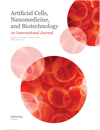
Artificial Cells Nanomedicine and Biotechnology
Scope & Guideline
Unlocking the Potential of Nanomedicine for Enhanced Patient Care.
Introduction
Aims and Scopes
- Nanoparticle Synthesis and Characterization:
The journal emphasizes the synthesis and characterization of various nanoparticles, particularly those derived from natural sources, highlighting their potential applications in drug delivery, antibacterial properties, and cancer treatment. - Biocompatibility and Therapeutic Applications:
Research on the biocompatibility of nanoparticles and their therapeutic applications is a core focus, with studies investigating how these materials can be effectively used in medical treatments. - Cancer Research and Treatment:
A significant portion of the journal's articles is dedicated to cancer research, exploring novel drug delivery systems, photodynamic therapy, and the role of nanoparticles in enhancing therapeutic efficacy. - Microbiome and Metabolomics:
The journal also addresses the interaction between nanoparticles and biological systems, including studies on the gut microbiome and its influence on health, as well as metabolomics-related research. - Innovative Drug Delivery Systems:
The development of advanced drug delivery systems, including liposomes, micelles, and other novel carriers for targeted and controlled release, is a prominent theme in the journal's publications. - Environmental and Green Chemistry:
Research on environmentally friendly synthesis methods for nanoparticles, emphasizing sustainability and reduced toxicity, is increasingly featured in the journal.
Trending and Emerging
- Artificial Cells and Biomimetic Systems:
Research on artificial cells and biomimetic systems is gaining momentum, highlighting innovative approaches to drug delivery and therapeutic interventions. - Nanotechnology in Regenerative Medicine:
The application of nanotechnology in regenerative medicine is emerging as a key theme, with studies exploring the use of nanoparticles for tissue engineering and regenerative therapies. - Machine Learning and Bioinformatics Applications:
There is an increasing trend towards integrating machine learning and bioinformatics in research, particularly in the analysis of complex biological data and the development of predictive models in medicine. - Therapeutic Nanoparticles for Infectious Diseases:
The journal is seeing a rise in publications focused on the use of nanoparticles for combating infectious diseases, particularly in the context of recent global health challenges. - Personalized Medicine Approaches:
Emerging studies are increasingly focusing on personalized medicine, utilizing nanoparticles and artificial cells to tailor treatments based on individual patient profiles.
Declining or Waning
- Traditional Chemical Synthesis Methods:
There is a noticeable decline in articles focusing on traditional chemical synthesis methods for nanoparticles, as the field increasingly shifts towards greener, more sustainable approaches. - Basic Mechanistic Studies without Application:
Research that centers solely on basic mechanistic studies without direct applications in nanomedicine or biotechnology is becoming less frequent, with a growing preference for studies that demonstrate practical therapeutic relevance. - In Vitro Studies without In Vivo Validation:
Papers that only present in vitro findings without subsequent in vivo validation are diminishing, as the journal increasingly prioritizes studies that bridge laboratory findings with clinical implications.
Similar Journals
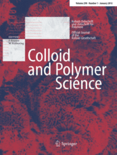
COLLOID AND POLYMER SCIENCE
Pioneering Insights in Colloid and Polymer DynamicsCOLLOID AND POLYMER SCIENCE is a prestigious peer-reviewed journal published by SPRINGER that serves as a vital resource for researchers, professionals, and students in the fields of Colloid and Surface Chemistry, Materials Chemistry, and Physical and Theoretical Chemistry. With ISSN 0303-402X and E-ISSN 1435-1536, the journal has established itself as a significant contributor to the scientific community since its inception in 1974, continuously providing valuable insights into the dynamic interplay between colloids and polymers. The journal is recognized for its rigorous quality, reflected in its Quartile rankings; it stands in Q3 for Colloid and Surface Chemistry and Physical and Theoretical Chemistry, and Q2 for Materials Chemistry and Polymers and Plastics in 2023. COLLOID AND POLYMER SCIENCE is an important platform for disseminating high-impact research that addresses fundamental and applied aspects of these critical fields, enhancing our understanding of material interactions and fostering innovations. The journal operates under traditional subscription models, ensuring that optimal academic rigor is maintained. With a strong emphasis on interdisciplinary studies, it encourages contributions that bridge gaps between theory and application, making it an essential reading for those aspiring to excel in the diverse world of materials science.

Materials
Unlocking the potential of innovative materials for a brighter future.Materials is an esteemed journal published by MDPI, dedicated to advancing the fields of Condensed Matter Physics and Materials Science. With its commitment to Open Access since its inception in 2008, the journal has made significant strides in disseminating high-quality research globally, allowing researchers, professionals, and students easy access to cutting-edge studies without financial barriers. Hailing from Switzerland, the journal has shown remarkable growth and prominence, currently ranked in the Q2 quartile in its categories according to the latest assessments, which highlights its impact within the community. As the journal converges its focus from 2008 to 2024, it aims to continually foster a robust exchange of knowledge on innovative materials and their applications, thereby supporting the evolving landscape of science and technology. With an E-ISSN of 1996-1944 and a user-friendly platform, Materials is poised to be a leading choice for scholars eager to contribute to and engage with pioneering research.

Inorganic and Nano-Metal Chemistry
Pioneering Research in Inorganic Chemistry for a Sustainable Future.Inorganic and Nano-Metal Chemistry is a premier journal published by Taylor & Francis Inc, focusing on innovative research and advancements in the fields of inorganic chemistry and nano-metal applications. With an increasing impact in the academic community, this journal has established itself within the Q3 category of both Inorganic Chemistry and Physical and Theoretical Chemistry as of 2023, reflecting its global recognition and influence. The journal is accessible as an Open Access publication, ensuring that research findings are freely available to a broad audience, promoting transparency and collaboration in scientific exploration. Based in the United Kingdom, Inorganic and Nano-Metal Chemistry aims to disseminate high-quality peer-reviewed articles that not only highlight fundamental studies but also push the boundaries of technological applications in areas such as catalysis, materials science, and nanotechnology. Researchers, professionals, and students will find this journal an invaluable resource for the latest developments and interdisciplinary insights in the ever-evolving landscape of inorganic and nano-metal chemistry.

BioNanoScience
Transforming Biomedical Research with Nanotechnology Insights.BioNanoScience is an esteemed academic journal published by SPRINGER, dedicated to the interdisciplinary field of bioengineering and biomedical engineering. With an ISSN of 2191-1630 and an E-ISSN of 2191-1649, the journal has established itself as a significant platform for sharing innovative research and developments in nanotechnology as applied to biomedical contexts. Although it operates under a subscription model, the journal maintains a strong impact within its field, achieving a Q3 quartile ranking in both categories for 2023 and has a solid standing in Scopus rankings, where it ranks #129 out of 303 in Biomedical Engineering and #87 out of 162 in Bioengineering. The journal not only aims to publish high-quality research, but also seeks to foster collaboration between scientists, engineers, and healthcare professionals to address pressing global health challenges through nanotechnology. As an essential resource for researchers, professionals, and students, BioNanoScience continues to contribute to the advancement of knowledge and innovation in bioengineering.
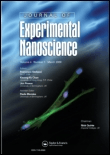
Journal of Experimental Nanoscience
Transforming Ideas into Nanoscientific InnovationsThe Journal of Experimental Nanoscience, published by Taylor & Francis Ltd, is an esteemed open-access journal dedicated to advancing the field of nanoscience and its applications across various disciplines. Since its establishment, the journal has aimed to provide a comprehensive platform for researchers and professionals to disseminate innovative findings in nanotechnology, bioengineering, and materials science. With an ISSN of 1745-8080 and E-ISSN of 1745-8099, this journal has been pivotal in promoting high-quality research in its converged years from 2006 to 2024. Recognized for its contributions, it currently holds a Q3 ranking in core categories such as Bioengineering, Biomedical Engineering, Materials Science, and Nanoscience and Nanotechnology. Although its H-index is not specified, its Scopus ranks reflect its growing influence, with notable percentiles in various engineering fields. By offering open access since 2016, the Journal of Experimental Nanoscience enhances the accessibility of vital research to a global audience. Researchers, professionals, and students will find this journal an invaluable resource for staying abreast of the latest advancements and breakthroughs in nanoscience.
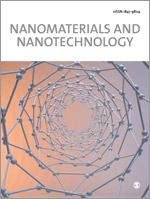
Nanomaterials and Nanotechnology
Connecting Researchers to the World of NanomaterialsNanomaterials and Nanotechnology is a premier journal published by HINDAWI LTD, dedicated to advancing knowledge in the rapidly evolving fields of nanomaterials and nanoscale applications. Established as an Open Access platform since 2011, the journal aims to disseminate high-quality research that provides insights into nanotechnology's manifold aspects, including biotechnology, ceramics and composites, as well as electrical and electronic engineering. With a compelling impact factor reflected in its robust Scopus rankings—placing it in the 80th percentile in Engineering and the 72nd percentile in Biotechnology—it stands as a key resource for researchers, professionals, and students seeking to stay at the forefront of innovation in materials science. The journal occupies a distinguished position in the academic community, featuring studies that explore the synthesis, characterization, and application of nanomaterials, thereby contributing significantly to scientific discourse and technological advancement in this critical area.
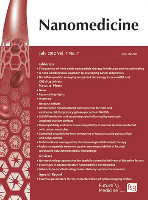
Nanomedicine
Exploring the Intersection of Nanotechnology and MedicineNanomedicine, published by Future Medicine Ltd, is a premier academic journal dedicated to the rapidly evolving field of nanotechnology in medicine. With an emphasis on innovative research and applications, this journal encompasses a broad spectrum of topics including bioengineering, biomedical engineering, and nanoscience, among others. Featuring an impressive Q1 ranking in Development and multiple Q2 rankings across significant categories, it serves as a pivotal resource for researchers and professionals aiming to stay at the forefront of advancements in these disciplines. While the journal is not open access, it is accessible through various institutional subscriptions, ensuring wide dissemination of cutting-edge findings. Notably, it has achieved substantial impact within the scientific community, indicated by its high rankings in Scopus and overall commitment to enhancing the understanding and application of nanomedicine. This journal is a vital conduit for fostering collaborations and innovations that transcend traditional medical paradigms.

ADVANCED DRUG DELIVERY REVIEWS
Exploring Innovations in Drug Delivery.ADVANCED DRUG DELIVERY REVIEWS, published by ELSEVIER, is a leading journal in the field of pharmaceutical sciences, particularly acclaimed for its contributions to the disciplines of pharmacology, toxicology, and pharmaceutics. With an impressive 2023 Scopus rank of #1 out of 183 in its category, this journal is situated in the Q1 quartile, reflecting its high impact and the relevance of its published research. Since its inception in 1987, it has continually focused on the latest advancements in drug delivery systems, making it an indispensable resource for researchers, professionals, and students interested in the innovative developments that shape the pharmaceutical landscape. The journal aims to publish comprehensive and authoritative reviews that foster a deeper understanding of drug delivery mechanisms, technologies, and their clinical applications. Although it operates under a subscription model, the value it provides through rigorous peer-reviewed content ensures it remains an essential tool for anyone seeking to enhance their knowledge in this rapidly evolving field.
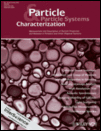
PARTICLE & PARTICLE SYSTEMS CHARACTERIZATION
Fostering Collaboration in Particle ResearchPARTICLE & PARTICLE SYSTEMS CHARACTERIZATION is a distinguished journal dedicated to advancing the knowledge within the fields of Chemistry, Condensed Matter Physics, and Materials Science. Published by WILEY-V C H VERLAG GMBH in Germany, this journal has established a solid reputation since its inception in 1984, showcasing research aimed at understanding the intricate properties and behaviors of particulate systems. With an impressive Q2 ranking in its respective categories and Scopus ranks indicating a robust standing in the global research community, it serves as an essential resource for researchers, professionals, and students. Although it does not currently offer Open Access options, its comprehensive articles and reviews provide valuable insights that contribute significantly to the ongoing discourse in these scientific domains. As it prepares to celebrate four decades of publication, PARTICLE & PARTICLE SYSTEMS CHARACTERIZATION continues to provide a vital platform for emerging knowledge, fostering innovation and collaboration among scientists dedicated to the study of particle systems.

Biomaterials Research
Leading the charge in materials innovation.Biomaterials Research, published by the American Association for the Advancement of Science, is a prominent open access journal established in 2014, dedicated to advancing the field of biomaterials. Based in the United Kingdom, this journal has swiftly become an essential platform for researchers and practitioners, offering groundbreaking insights in biomaterials, biomedical engineering, ceramics and composites, and miscellaneous medical fields. With its impressive Q1 ranking across multiple relevant categories in 2023 and its strong Scopus rankings, including a remarkable 90th percentile in the medicine category, Biomaterials Research showcases high-quality, peer-reviewed research designed to address both practical and theoretical challenges in biomaterials science. As an open access journal, it promotes wider dissemination and accessibility of research findings, crucial for fostering innovation and collaboration within the scientific community. Researchers, professionals, and students alike are encouraged to contribute, read, and engage with the latest developments in this dynamic field.